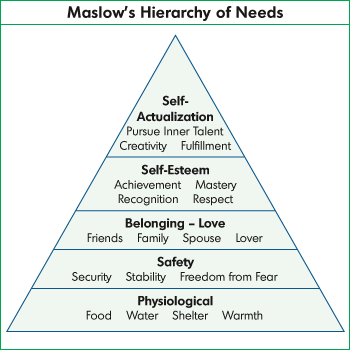 Life Law #7: Life is managed; it is not cured.
Life Law #7: Life is managed; it is not cured.
Strategy: Learn to take charge of your life.
This law was freeing in the sense of, well, letting me know there was no exact ‘finish line’ that I am aiming for. No cure. There is some freedom in knowing that the mess of living is normal.
For some reason it also made me remember the chart here on the left. Although Maslow’s Hierarchy of Needs may not be perfect it does help me to think more clearly about peoples motives. For example someone who is struggling with putting food on the table and staying ahead with the house payments will often be stressed and find that achieving things higher up the pyramid is difficult. Maybe this is why the leading cause of divorce is money fights and money problems.
How high up do you think horses can make it on this? My opinion is rung number three. It is always difficult to work with horses who are struggling with the first needs (Physiological). The second rung is the basis of most (reputable) training programs-developing the horses feeling of security and freedom of fear. Rung three seems to happen for horse when they are in a balanced herd or are with a trainer/human they respect. After that I begin to struggle. Mastery, and recognition don’t seem to be something they value.
It is interesting for me to think that maybe the horses can reach a little higher when they are with humans then in the herd. For example some horses, the top ones at least, enjoy respect and probably even some level of fulfillment within the herd. Maybe it is possible for a higher percentage of the herd to achieve a feeling of well being and respect when one one one with a human?
Anyway, the point is that life is managed…not cured. The horses in our care do not have the privilege of managing their life but are dependent on us. Strive to take charge of your life and improve those around you.
2 Comments
Leave a Comment

FREE PDF DOWNLOAD
WHY IS MY HORSE...?
100% Private - 0% Spam
No one taught you the skills you need to work through these things.
Riders often encounter self-doubt, fear, anxiety, frustration, and other challenging emotions at the barn. The emotions coursing through your body can add clarity, or can make your cues indistinguishable for your horse.
Learning these skills and begin communicating clearly with your horse.
Click here to learn more.

nice-i like this diagram-helpful!
in my experience, more with dogs than horses and in human-animal partnership work, they do feel a sense of accomplishment and increased self respect and calmness that comes with achieving a goal and a job well done. it seems to work well in challenging situations, when they GET it and then DO it perfectly. they know it and prance!
personally i only find this is the case with animals that have been trained without food though, as the reward is truly the accomplishment, not a piece of food–which is distracting from the partnership (in my experience). i don’t know about animals in the wild if they feel that accomplishment from partnerships and achievements in their herd or pack. interesting to think about. i bet they do….
i have heard and read about accounts like this involving horses from from high level equine competitors in many types of events as well–jumping, cross-country, herding, dressage, police work.
As I look at this law and compare it to my own life and horses, I found it funny to see that my own foot is on rung one and and three and somewhere I missed the second one, Now when I look at the my horses I see that I have planted firmly in the all three rungs, and working on the top two. But I also have to keep in mind that with mastering and achieving is more of a human emotion. Although when seeing a horse doing a job that they love, such as Hickstead, Roxy, and Johnathan Fields horse Quincy, they seem to except the achievements with grace and instilling self esteam and self actualization in their human partner.
What a wonderful though.